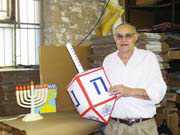Have you recently purchased a dreidel for your little Bubbelah? Chances are, it came from the Hoboken-based Jewish gift manufacturer KTAV, located at 900 Jefferson St.
KTAV owner Sol Scharfstein is 81 and has been making dreidels for longer than he can remember. His parents had the first and only lead dreidel casting machine made by a German die maker. It was designed by his father Asher Scharfstein in 1924 and was used for more than 30 years and produced more than one million dreidels.
The mold is a scissor-action die with two moveable pieces. When the mold is closed, the operator pours molten lead into the die. Within 10 seconds, the lead hardens, the mold is open and the dreidel is removed. The casting of lead dreidels was discontinued due to the labor costs and toxicity of the lead.
“My parents made lead dreidels before we knew lead was harmful,” Scharfstein said last week. “But they weren’t completely lead, because we used to use the old pipes that plumbers were throwing away.”
Scharfstein said the machine became his family’s business.
“You can make 50 dreidels an hour, so my parents made 25,000 their first year in the dreidel business and sold them for two cents a piece.”
Since the original Scharfstein 1920s operation out of Manhattan’s Lower East Side, which he calls “The Jewish Ghetto,” KTAV moved to various New York City locations until they finally moved to Hoboken 15 years ago. Although Scharfstein likes Hoboken, the city is forcing them to leave because the northwest region of town is being redeveloped.
“They’re kicking us out and all the other factories,” said Scharfstein. “We’ll have to leave by June, but I’d like to stay in New Jersey. We have very nice employees, and we have a responsibility to keep them. We’re going to try awfully hard to stay in the area. Some employees have been here for 15 years. We keep all our employees. They stay healthy here.”
KTAV has not only relocated throughout the years, but they’ve also expanded their selection of merchandise. KTAV offers more than 500 items in their catalogue of Jewish gifts, which includes menorahs, religious children’s books, Torahs, Hebrew stickers, games, Hannukah cookie cutters, chocolate gelt and even college textbooks on the Jewish heritage.
The history of the dreidel
According to an old legend, the Hannukah top was invented during the time of the Maccabees, a family from the priestly tribe. Hellenistic leader Antiochus forbade the study of the Torah, which is the first five books of the Bible. Nevertheless, people gathered in small groups and studied the Torah secretly. If soldiers approached, the groups scattered.
Another means they used to escape detection was the dreidel game. The dreidel would lie on the table, and at a lookout’s warning, the students spun the top. When soldiers arrived, the thought they were playing an innocent game.
Since the Middle Ages, the popular little dreidel has been part of Hannukah fun throughout the world. The dreidel always bears the Hebrew letters Nun, Gimel, Hay and Shin. These are initials for Nes Gadol Hayah Sham, which means “A great miracle happened there,” referring to the miracle of the oil lamp that burned for eight days after the Jews reclaimed Jerusalem from Hellenistic occupation and found just a little bit of oil to light their temple. After spinning the top, the dreidel tells players what to do with the pot of gelt, or money. Nun means take nothing from the pot; Gimel means take everything from the pot; Hay means take half; Shin means put a piece in the pot.
The dreidel business
The most common dreidels are made of wood or plastic. Although the famous dreidel song says they’re made of clay, Scharfstein said there’s a reason why clay dreidels are not that common.
“I made a dreidel out of clay once, but it was so heavy that it wouldn’t spin,” said Scharfstein. “They don’t really work.”
During this busy holiday season, KTAV ships from 100 to 150 orders a day. They ship all over the United States, including Hawaii and California, and the world. The company regularly ships orders to Australia, England, Poland and Eastern Europe.
“We’re just a small little fly in the ointment, but we’re okay,” said Scharfstein. “We could do more, but who is a happy person, is a person with a happy lot.”
But Scharfstein is worried about the future of his company, because his children will not be taking over the family business when he finally retires.
“They’re all professions,” said Scharfstein. “They’re doctors and lawyers, and it’s sad, because I would like the business to continue. To this day, I get a chill when people order books for their children that they remember growing up with. It’s an important business. We help continue the tradition, and our books help teach children about their heritage.”
KTAV manufactures some products and dreidels in Hoboken, and others are produced in Hong Kong, Taiwan and Israel.
To find out more about KTAV or to receive a catalogue, call (201)963-9524 or visit their website at www.ktav.com.
